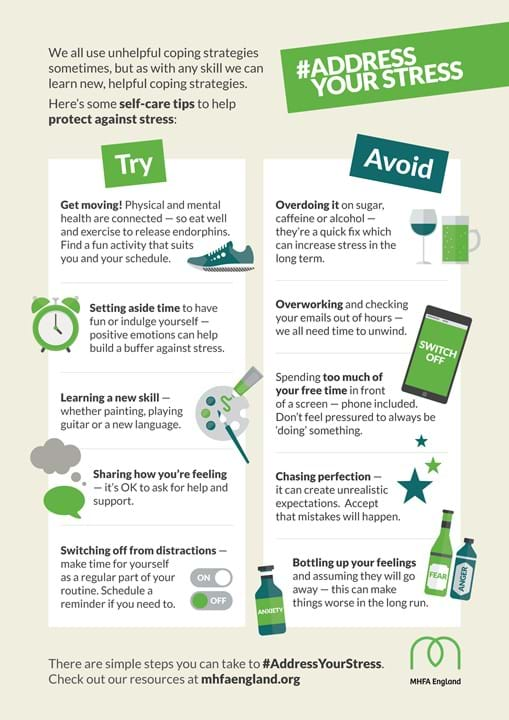Stress
What is stress?
People feel stressed when they feel like the demands or pressures on them are more than what they can cope with. Everyone feels stressed at times, but sometimes these feelings of stress can become overwhelming and can even lead to mental health concerns and challenges.
What does stress feel like?
You may feel under pressure, worried, tense, upset, sad, and angry – or maybe a mixture of uncomfortable feelings. Although these feelings are normal, if you are experiencing them a lot or for a long period of time, it is important that you talk to someone about them. Try talking to your parent or carer first, or a friend, if this still doesn't help it might be time to seek support with your mental health. If you are feeling angry young minds has information and support here.
What causes stress?
Young people often feel stressed because of school pressures, this can be pressures of exams and workload. It is normal to feel nervous around exam time, however if you feel you cannot cope with how you are feeling, try speaking to a member of staff at the school, ideally your school pastoral team who are trained to help with these particular kinds of things. You may also feel stressed because of peer pressures from friendship groups or pressures from bullies. If this is the case speak to someone you trust, whether that be a friend, family member or a staff member at the school.
Sometimes things can be stressful at home, this may be because of arguments within the family, or between you and your family members. In this situation it is important to speak to someone else you trust about this and get support. It is also important to look after yourself when you are living in this environment. See our Look after yourself page for more information.
Some of the other causes of stress are divorce, illness or death of someone close or abuse. In these situations it is extremely important that you speak to someone you can trust and if you don't know anyone you can trust please call one of the support lines listed on our Get help now page.
It is important to remember that positive events such as starting a new college or going to university can also be stressful! Many people need a little bit of stress to give them the “get up and go” to do things that are important to them.
What are the effects of stress?
Stress can affect different people in different ways.

How do I cope with stress?
Don't suffer in silence! Feeling alone makes stress harder to deal with. Share how you are feeling with someone you trust and ask for help.

When to get help?
If you feel like you don't know why you are stressed, the things causing you stress are long term and the problems keep building or if you cannot cope with your feelings of stress, it is important to talk to someone about them.
Signs that stress is getting too much and that you should get help:
- You feel that stress is affecting your health.
- You feel so desperate that you think about stopping school, running away or harming yourself.
- You feel low, sad, tearful, or that life is not worth living.
- You lose your appetite and find it difficult to sleep.
- You have worries, feelings and thoughts that are hard to talk about because you feel people won’t understand you or will think you are ‘weird’.
- You hear voices telling you what to do, or making you behave strangely.
- You are using drugs or alcohol to block out stress.
Who can help?
It is important that you talk to someone you trust and can help you like:
- a close friend
- parents, a family member or family friend
- a school nurse, teacher or school counsellor
- a social worker or youth counsellor
- a priest, someone from your church or temple.
Some people may find it easier to talk to somebody on the phone. See the section on further information below for details of confidential advice lines- childline for any young person in difficulty and ‘Talk to Frank’ for anyone wanting help or advice about drug problems.
Your GP or another professional can refer you to your local child and adolescent mental health service (CAMHS).

